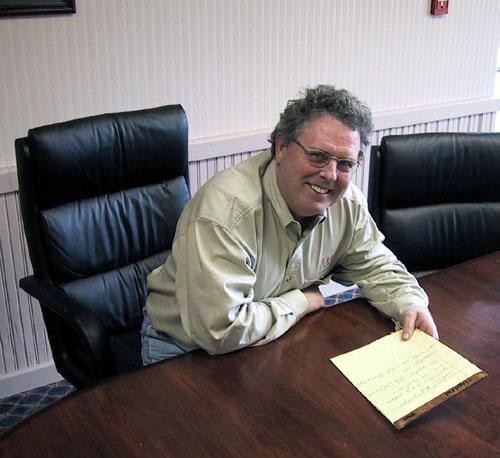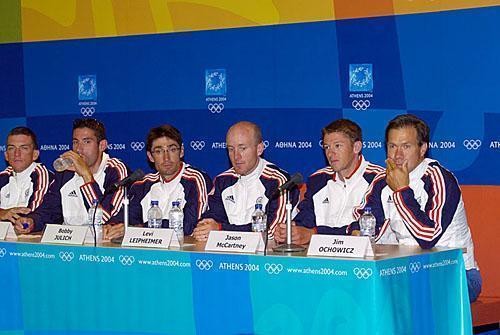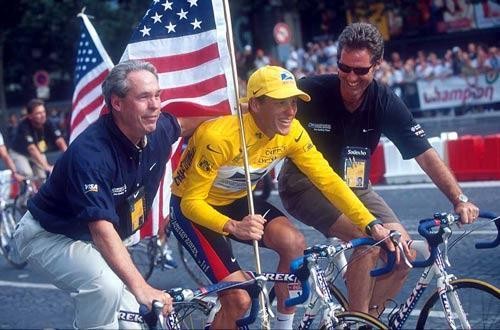Bisceglia fires back at USA Cycling, and Ochowicz
Did he walk or was he pushed? Whatever really happened to Gerard Bisceglia, the former CEO of USA...



News feature, November 28, 2006
Did he walk or was he pushed? Whatever really happened to Gerard Bisceglia, the former CEO of USA Cycling and his 'wrongful termination' law suit against his former employer and its president, Jim Ochowicz, has the potential to bust open the inner network of American cycling's powerbrokers. Cyclingnews' Mark Zalewski reports on a case that has ramifications for the sport in one of its biggest growth markets.
The former CEO of USA Cycling, Gerard Bisceglia, filed a wrongful termination civil suit in Colorado earlier this month against USA Cycling and the president of its board, Jim Ochowicz. Bisceglia alleges he was "terminated without cause" - in direct contrast to USA Cycling's official announcement that Bisceglia had resigned voluntarily. The day after Bisceglia was fired, Ochowicz said to Cyclingnews, "There was no decision, Gerard resigned from USA Cycling".
Bisceglia's contract was due to run until September 1, 2008, after he signed an extension on December 15, 2003. The former retail industry executive with the impressive CV (see interview) originally joined the USAC on July 1, 2002, signing a five-year contract.
Cyclingnews obtained a copy of his suit, and it reveals how Bisceglia objected to the non-disclosure of external financial activities of the USAC president, Ochowicz, who, among other roles, has also worked as a paid consultant to the Phonak cycling team.
Further, Bisceglia rejected the USAC board's support for Ochowicz after there was an investigation of what could be called the "Upsolut affair". This is where Ochowicz earned a total of 75,000 Swiss francs (approx US$60,000) over a three-year period for setting up a sponsorship deal between the USAC, one of its major sponsors, BMC Software, and Upsolut Event GmbH, promoter of the then Zurich World Cup men's road race (aka Meisterschaft von Zurich) between 2002 and 2004.
In his complaint lodged on November 8, 2006, with the District Court, El Paso County, Bisceglia says he did not "learn of Ochowicz' broker's fee until nearly one and a half years after it should have been reported to the board". It was only in "mid-2003, during a casual conversation with the (USAC) marketing director", that Bisceglia learned about Ochowicz' fees from Upsolut.
Get The Leadout Newsletter
The latest race content, interviews, features, reviews and expert buying guides, direct to your inbox!
The following year, Bisceglia claims he reported knowledge of Ochowicz' finder's fee to the USAC's CFO (chief financial officer), who was said to be unaware of the additional remuneration. Apparently the CFO believed "it might be a violation of law, and that it neeed to be reported to the (USAC) board". Further, the USAC general counsel was called in and then Ochowicz was allegedly presented with an ultimatum - inform the board, or they will.
Bisceglia claims he took this action as it was required of him by his position, and this included informing Ochowicz that he would not allow the fee to continue or allow future arrangements with fees to occur. The suit states that, "In response, Ochowicz said something to the effect of, 'After all I have given to this sport I am entitled to the money. You work for me, I don't work for you. You'll see who the boss is'."
However, Ochowicz did inform the board, which subsequently ordered an independent investigation in June 2004. If Bisceglia was expecting a thundering rebuttal by the board to its president's action, he would have been sorely disappointed. The USAC board wrote to Ochowicz on August 9, 2004, and decided that "the sponsorship contracted you facilitated with Upsolut to be of great benefit to USAC and BMC".
Bisceglia's suit - which uses this letter as 'Exhibit A' - says of the correspondence, "The board's attempt to 'ratify' Ochowicz' finder's fee agreement and his failure to comply with USAC's financial disclose (sic) requirements was spurious and a sham".
Bisceglia protested as he believed finder's fees and the like violated various by-laws pertaining to non-profit organisations, but the end result was a meeting in April 4, 2006, with Bisceglia, Ochowicz "and another board member", and at that meeting the CEO was allegedly given his marching orders - or voluntarily resigned, according to Ochowicz - and a security guard escorted him from the USAC headquarters in Colorado Springs.
However, there is period of time that's not covered in Bisceglia's suit. There is almost two years from when Ochowicz received the full support of the board in August 2004 - and even praise for 'facilitating' the deal between Upsolut, BMC Software and USAC - and then the final meeting in April 2006 when Bisceglia was allegedly marched. The only reference in Bisceglia's suit is, "In retaliation for Plaintiff's objection to Ochowicz' conflict of interest, and causing it to be disclosed to the board, when the opportunity arose, Ochowicz caused the board to discharge Plaintiff".
Larger issues
This lawsuit - if it does actually go to court - has the potential to uncover what many people believe has existed for years: a network of powerbrokers who weild undue influence over the sport's direction in the USA, and not always seemingly in the best interests of its constituency, ie, the members of USA Cycling.
While the suit only specifies that Ochowicz is employed by "an investment banking firm in San Francisco", it is widely reported that he is a broker at Thomas Weisel's highly successful investment banking firm, Thomas Weisel Partners. Weisel is also behind Tailwind Sports, owners of the then US Postal Service and now Discovery Channel Pro Cycling teams, which supported Lance Armstrong to his seven Tour de France wins.
Concern has been raised in the past regarding the make-up of USA Cycling's board of directors, as more positions became occupied by persons with ties to Weisel. This consolidation of power within USA Cycling began when Weisel negotiated three seats on the board of USA Cycling under terms of a 'bailout' agreement with the almost defunct US Cycling Federation in 2000. It continued with the appointment of Steve Johnson as executive director of the USA Cycling Development Foundation (of which Weisel is the president). The foundation raises money to support USA Cycling, providing a significant portion of its operating budget.
A result of Bisceglia's departure was the elevation of Johnson, who was serving as USA Cycling chief operating officer, to become the interim and eventual full-time CEO of USA Cycling.
An article last year in the SF Weekly and another this year in Outside Magazine, both pointed to the inter-relationships and other issues surrounding the leadership of USA Cycling. The SF Weekly article resulted from the USAC's unprecedented response to allegations published in the French sports newspaper, L'Equipe, last August. It reported that lab results showed that urine samples provided by Lance Armstrong during the 1999 Tour de France had allegedly showed traces of EPO (a claim vigorously denied by Armstrong). The French newspaper went further and claimed that the financial and personal links between Weisel, Armstrong, and USA Cycling were a conflict of interest, supposedly demonstrated by USAC's very public criticism of the L'Equipe allegations.
At the time, the USAC issued an official statement about the allegations, with the then CEO Bisceglia describing them as "preposterous" (see report). The then COO, Johnson, went further, and told Reuters, "To me, this is an issue for the French people. They seemed very concerned about it, and frankly I don't care what they think. And I don't think Lance does either. This is just a publication in a French tabloid newspaper. That's our perspective."
The inference was that by defending Armstrong, the USAC executives had spoken out of turn; it was considered inappropriate for USAC - it should leave comments about an ongoing doping controversy to the rider, the rider’s spokespeople, and the US Anti-Doping Agency. At the time, Johnson said: "Why would that be a conflict of interest? Explain it to me."
A result of the USAC's public condemnation of the L'Equipe allegations was that the French newspaper was seen as taking an anti-American stance; it was not about Armstrong, but rather, it was the French playing politics and attacking an American hero who'd conquered France's sporting monument seven times.
Speaking of connections, the French newspaper is owned by the same company, Amaury Sport Organisation, that also owns the Tour de France, the race that gave Armstrong his platform to legendary status. It could be said that a business operation of a major French media conglomerate setting out to attack the credibility of a related property defies normal business logic; or, it could demonstrate a separation of the editorial from commercial within ASO.
Waiting until court
In August of last year, it seems that Bisceglia was prepared to toe the party line; speak out in defense of Armstrong and attack the French newspaper for being unethical and unfair. When reached by Cyclingnews after he filed suit, Bisceglia would only say, "Under advice of counsel, I cannot speak about it at this time." Neither Ochowicz or Weisel could be reached or would comment on the record. USA Cycling's marketing director Andy Lee said only, "Since it's an ongoing legal matter we cannot comment on it." And Bisceglia's lawyer was no different: "I really don't want to comment on anything related to this case."
It was only the USA Cycling board of directors vice president, Mark Abramson, who returned Cyclingnews' calls that were made to Ochowicz. While he would not comment directly on allegations raised in the suit, he did state generically, "We feel we have more than satisfied the requirements of Gerard Bisceglia's employment contract." When asked generally about the issue of conflicts of interest by the board, Abramson replied, "We have a quite comprehensive governance policy and procedures to deal with conflicts of interest. In the larger sense, USA Cycling is aligning itself due to the Sarbanes-Oxley Act in terms of conflicts of interest issues."
In terms of the broader concerns about the board and its members, Abramson said, "Inherently, people who volunteer at many different levels of cycling love the sport and want to see it go. In my work with the board of directors that comes across loud and clear. I don't get the sense that people are wanting to get on the board of directors to influence it for themselves."
Weisel has not commented - publicly at least - on this suit or the previous coverage of his relationship to USAC and the perception of his apparent control over the sport in the USA.
It seems that shedding light on these issues could be a by-product of the Bisceglia suit, with the public backlash to these proceedings already beginning in the form of an online petition calling for the resignations of Ochowicz, Johnson and Weisel along with the reinstatement of Bisceglia. However, the cycle racing community has seemingly been registering its dissatisfaction with the way USA Cycling has been run for years, with other competitor-based racing organizations forming on their own, acquiring members and holding their own events outside the control of the USAC. It was not until recently, during Bisceglia's tenure, that USA Cycling's membership began to rebound - even with the success of Armstrong - with the organization posting a six percent increase over 2005 numbers.
The next steps in this process will involve lawyers and motions, and there is also the potential for an out-of-court resolution that could keep the public out of the loop entirely. The Colorado parties have 21 days to respond to the suit, while Ochowicz has 30 days - with motions for dismissal and continuances likely to be the first moves.
(Cyclingnews staff contributed to this report.)